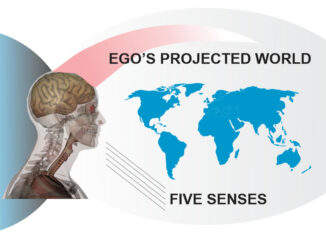
August 17, 2020

The terms ‘simple’ and ‘easy’ are so often found together to describe the same thing that it is not surprising that the two terms are often unconsciously conflated. This is of little or no consequence most of the time since what is simple is often also easy.
Not so, however, when the term ‘simple’ is applied to ACIM, as Jesus does throughout his course. Ironically, it is the Course’s simplicity that is hard for us to grasp. In describing his course, Jesus says … For here we have an answer, clear and plain beyond deceit in its simplicity. All the complexities the world has spun of fragile cobwebs disappear before the power and the majesty of this extremely simple statement of the truth (W-pI.122.6:6-7).
Understandably, when one begins reading and perhaps, studying ACIM, it can take some time to adjust one’s thinking to align with its thought system. While the writing style is unfamiliar to most readers in the beginning, it is what the Course says that is so challenging. The most basic metaphysical premise of ACIM … that there is no world (W-pI.132.6:2) … confronts our belief in the reality of our perceptions. Thus begins the process of realizing that our self/ego generated experience is not the truth. We must develop the humility to question the assumption that our perceptions are correct, and the honesty to recognize that we are wrong about all of our perceptions when they are generated from the ego.

This course is simple, clear, and direct. It is not difficult to understand nor is it open to interpretation. This is met with great resistance by our egos, whose hubris assures us that we are both capable of, and entitled to, make interpretations of everyone and everything in our world. As a result, each of us goes about our daily lives having “given everything we see… all the meaning that it has for us, (W-pI.2), never realizing that is why we see a meaningless world.” (W-pI.12)
“Knowing is not open to interpretation. You may try to ‘interpret’ meaning, but this is always open to error because it refers to the perception of meaning.” (T-3.V.5:1-2) Since “projection makes perception,” (T-21.In.1:1), this means that our interpretations of meaning are mistaken because they all come from the mistaken perceptions of ourselves as separate individuals in a world of separation. This is the illusion of the world that ACIM describes for its students throughout all three books.
So, the Course is simple, but because of our excessive pride and misplaced self-confidence, we, as egos, think we know how to judge what is in our best interest. Until we can develop the humility to step back and let Jesus lead the way, we will have trapped ourselves in our complicated world of judgment and attack. Until we are willing to commit to the simple practice of forgiveness, we will never experience the simplicity of salvation.
This article (The Difference Between Simple and Easy) copied with permission from Doug Sparks.




Be the first to comment